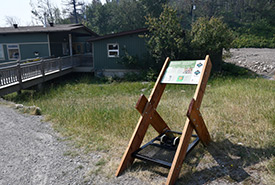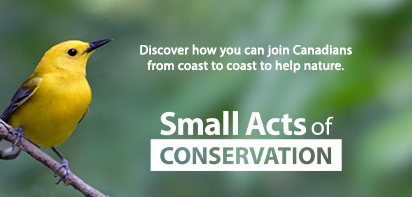Play Clean Go

Play Clean Go boot brush station and Waterton National Park signage (Photo by Waterton National Park)
While exploring one of Nature Conservancy of Canada's (NCC) properties, you may come across a Play Clean Go boot-brush station. The PlayCleanGo campaign was developed by the North American Invasive Species Management Association to stop the spread of invasive species across North America.
Over 400 years ago, when European settlers arrived in North America, they brought along invasive species for agricultural and medicinal uses. At that time, however, they did not understand the negative impacts these species would have on Canada's native plants and animals.
Invasive species are non-native plants, animals and other living organisms that outcompete native species and cause their extinction. Invasive species are introduced by humans through ship ballast water, firewood, illegal trade and importation.
An example of a human-introduced invasive species is the emerald ash borer, which originated from eastern Asia. The pest was first discovered in Windsor, Ontario, in 2002 and is now found throughout North America. Emerald ash borer larvae burrow deep into the bark of ash trees, which damages and eventually kills them.
Zebra mussels are another invasive species in Canada that has cost millions of dollars to control. Native to the Black Sea, these pests negatively impact the aquatic food chain by filtering out large quantities of plankton and starving other filter feeders.
Along with threatening Canadian wildlife, invasive species clog waterways, reduce crop yields and threaten our health. It is estimated that invasive species have cost Canada around $22.8 billion since 1970.
How you can help
- Stay on designated roads and trails.
To keep invasive species population localized, hike and drive on authorized routes.
- Clean your shoes and gear after hiking.
Use a boot brush to clean off any seeds stuck in the treads of your shoes and brush off any burrs on your gear. Doing so will ensure that you're not bringing along any invasive species with you.
- Do not dump bait in the water or on land.
Never dispose of live bait in the water if it is not native to the region. Non-native wildlife can quickly become invasive and spread diseases to local wildlife.
- Volunteer to remove invasive plants in your area.
Join NCC during one of our Conservation Volunteers events, where we work together to remove invasive plants.
- Purchase plants that are native to your area.
Not all plants sold at your local gardening store are native to Canada. When purchasing plants for your backyard, buy ones that are native to your region to protect Canada's natural areas.
Next time you go out on a hike, be mindful of what you're bringing back home with you. Take a minute to clean your gear, shoes and vehicle tires to prevent invasive species from spreading. If you would like to learn more about invasives, visit NCC's invasive species gallery.




